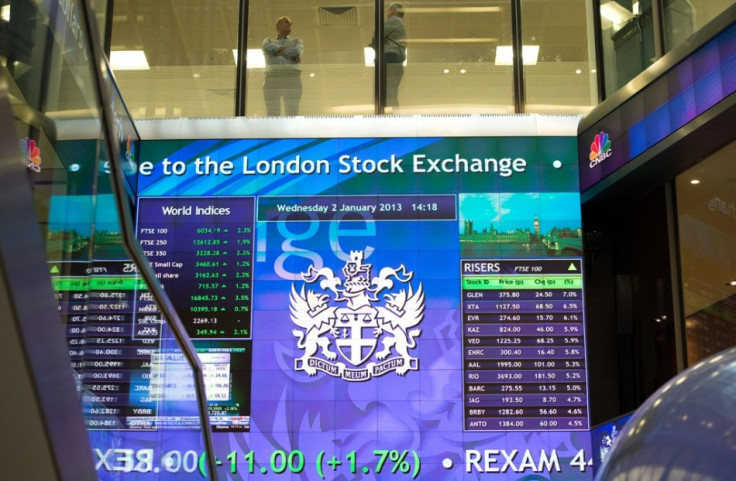European Markets Drop Ahead of UK Inflation Report Release

European markets opened lower on 13 November, and continued trading to the downside thereafter, ahead of the release of a key inflation report by Britain's central bank.
In addition, renewed US Federal Reserve QE taper fears also weighed down on the markets, particularly after conflicting remarks by three Fed presidents overnight.
The Stoxx Europe 600 index opened 0.3% lower to 320.59.
Britain's FTSE 100 opened 0.5% lower.
Germany's DAX and France's CAC 40 opened 0.2% lower.
Spain's IBEX 35 was trading 0.14% lower after opening lower.
Italy's FTSE MIB was trading 0.30% lower after opening lower.
The Bank of England will release its quarterly inflation report at 10:30 hrs GMT, when Governor Mark Carney will address a press conference. The central bank could revise its economic outlook given that the British economy is now on a recovery path.
European investors will also be tracking labour market data coming in from the UK, alongside industrial production data coming in from the Eurozone's statistics office.
In company news, British supermarket operator J Sainsbury reported a half-year underlying pre-tax profit of £400m, up from £374m a year ago. The company's shares rose 1.3% after the firm said it had increased its market share.
Danish shipping group Moller-Maersk and brewer Carlsberg have put out their earnings reports.
Earlier, in the US, Atlanta Fed President Dennis Lockhart said that the "encouraging" October jobs report would not fundamentally change the equation when Fed policymakers meet in December to decide on the future pace of the central bank's monetary policy.
Meanwhile, Minneapolis Fed President Narayana Kocherlakota said that with weak US inflation "there is no reason to be afraid of monetary stimulus."
Earlier on 12 November, Dallas Fed President Dennis Lockhart said that a QE taper remained a possibility after the Federal Open Market Committee's policy meeting, scheduled for 17-18 December.
Tim Radford, global analyst at Rivkin Securities said in a note to clients: "The longer the US Federal Reserve carries on with its $85 billion a month stimulus program the more investors and market commentators will look at possible negative side effects. Given the unprecedented size of the stimulus program, it's creating one big unknown in the market place. Even the brightest minds are struggling to grasp what longer-term unintended negative consequences could stem from the Federal Reserve's accommodative policies. And due to the big unknown factor, many investors fear another GFC style crash may eventuate. Such claims, due to the unknowns circulating the longer term impacts of Fed stimulus, are purely speculative and likely lack any real substance at this point in time".
Asian Markets Mixed
The Shanghai Composite finished 1.83% lower on 13 November. South Korea's Kospi finished 1.60% lower, Australia's S&P/ASX finished 1.37% lower and the Japanese Nikkei finished 0.15% lower.
Markets traded to the downside after a communiqué from a key Communist Party meeting in China failed to provide concrete details about the nation's reform road-map.
In Beijing, the four-day closed-door meeting of senior Communist Party officials ended on 12 November with a vaguely worded communiqué, devoid of specifics about how China's new leaders would reform the world's second largest economy over the next decade.
The communiqué did however mention that the government would push for fewer investment restrictions and greater rights for farmers.
Economists were left wondering as to how to interpret the document.
Mark Williams, an economist at Capital Economics said in a note to clients: "It hasn't met the high expectations that President Xi Jinping, among others, has raised. There are some steps in the right direction, but it seems to me to lack an overarching vision. This was an opportunity for the party to lay out a clear vision for where the country is heading. If they had been able to do that successfully, it would have had a big impact on the behaviour of officials. However, I don't think they have been given a clear steer. I was hoping the reforms would have been tied together into a broader vision somehow. China's imbalances are so great that you need more than a piecemeal approach."
Minggao Shen,head of China research at Citi said in a note to clients: "The information available for now suggests that an actionable plan will only be rolled out gradually going forward, and that the party has determined to simultaneously achieve reform and a growth target (doubling the 2010 gross domestic product in real terms) by 2020, which likely rules out the possibility of a short-term pain scenario".
Fan Zhang, an economist at UOB Kay Hian said in a note to clients: "It is very likely the government will allow private investment to enter into monopoly industries such as financials, energy and power, transportation, telecoms and public services. Though no details are being given for how the government will split revenue and responsibility for spending between central and local governments, we expect such reform will be one of the priorities for the government in the near to medium term. We believe more efforts will be made to protect rural residents' property rights, which is regarded as one of the most important measures to accelerate rural land reform. It is very likely there will be less restriction and lower entry barriers for foreign investors to enter China."
Wall Street Mixed
On Wall Street, most indices ended lower on 12 November with investors contemplating the Fed's next move, after conflicting remarks from three Fed presidents.
The Dow finished 32.43 points lower or 0.2% at 15,750.67 while the S&P 500 closed 4.2 points lower or 0.2% at 1,767.69. The Nasdaq ended flat at 3,919.92.
"The market was struggling to advance, after coming too far, too fast," Mark Luschini, chief investment strategist at Janney Montgomery Scott told CNBC.
© Copyright IBTimes 2025. All rights reserved.






















